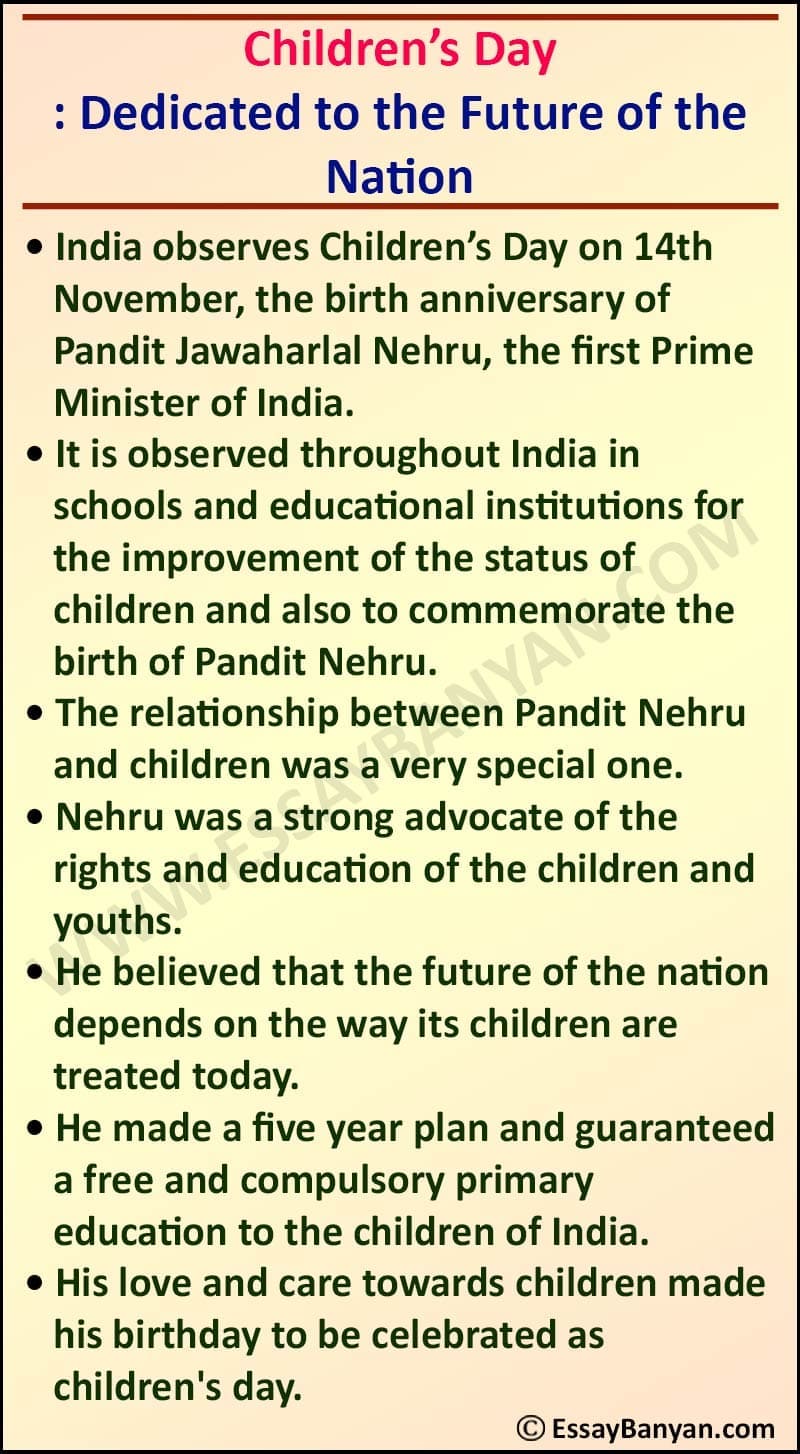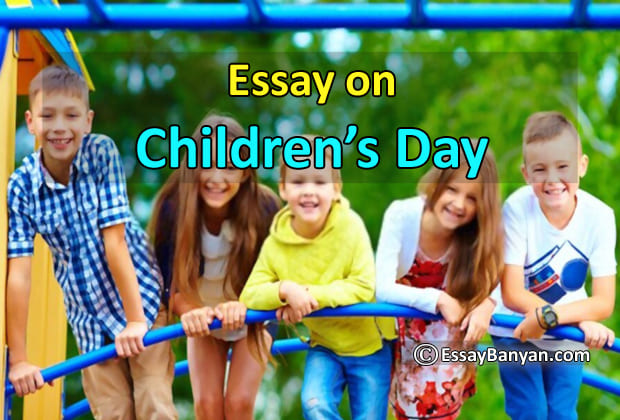India observes Children’s Day on 14th November, the birth anniversary of Pandit Jawaharlal Nehru, the first Prime Minister of India. It is observed throughout India in schools and educational institutions for the improvement of the status of children and also to commemorate the birth of Pandit Nehru.
Short and Long Essay on Children’s Day in English
Essay on Children’s Day for students of class 1, 2, 3, 4, 5, 6, 7, 8, 9, 10, 11 and class 12 in English in 100, 150, 200, 250, 300, 500 words. Also find short Children’s Day essay 10 lines.
Children’s Day Essay 10 Lines (100 – 150 Words)
1) Every year on 14 November, India celebrates Children’s Day.
2) The birth anniversary of Jawaharlal Nehru falls on this day.
3) This day highlights the need to care for and love children.
4) The first Prime Minister of India, Nehru Ji loved children very much.
5) To honor the love of Nehru Ji for children, his birth anniversary is observed as children’s day.
6) The day holds a special place in the heart of every child.
7) Schools and colleges remain close on this day.
8) Teachers and parents give gifts to the children on this day.
9) On this day, people distribute sweets and gifts to the poor and deprived children.
10) Schools organize several events or arrange picnics on this day to make children happy.
Why Children’s Day is Observed – Essay 1 (250 Words)
Introduction
Children’s Day is observed annually on 14th November to commemorate the birth anniversary of Pandit Jawaharlal Nehru and also to spread awareness about the rights and proper care of the children.
Children and Pandit Nehru
The relationship between Pandit Nehru and children was a very special one. Throughout his public life, both before and after independence, Nehru was a strong advocate of the rights and education of the children and youths.
He believed that better education and nourishment of children play a crucial role in the future of the nation. In fact, he believed that the future of the nation depends on the way its children are treated today.
During his tenure as the Prime Minister, Nehru established many prestigious institutions like All India Institute of Medical Sciences (AIIMS), Indian Institute of Technology (IITs) among others. In the five year plan, Nehru also guaranteed a free and compulsory primary education to the children of India.
Celebration of Joy and Concerns
For the children, it is a day to make merry and enjoy the celebrations thrown at them. They are free from attending classes and normal school work. They rather enjoy the greetings and gifts given to them by the teachers and guardians.
Children who belong to the financially poor background are also consulted and sweets are distributed to them.
Conclusion
Children are the future of a nation and its progress depends on their state. If the children are loved, happy, and content, the nation will progress well financially as well as socially.
Children’s Day before Independence – Essay 2 (400 Words)
Introduction
India celebrates Children’s Day every year on 14th November, the birth anniversary of Pandit Jawaharlal Nehru, the freedom fighter and also the first Prime Minister of India. Nehru is well remembered for his concern for the children.
Children’s Day before Independence
Prior to independence, India had been celebrating Universal Children’s Day on 20th November since 1956. Though many countries have been observing children’s day on several dates, the United Kingdom first proclaimed Universal Children’s Day in 1954.
India also started celebrating children’s day on 20th November. It was mostly celebrated in schools, colleges where the education fraternity discussed the methods to improve children’s education and other concerns.
Things pretty moved in the same way till 1964. It was the year when the great freedom fighter and first Prime Minister, Pandit Jawaharlal Nehru breathed his last on 27th May 1964. Pandit Nehru was a visionary who had worked tirelessly for making the country a better and safe place for the children. He was also fondly called Chacha Nehru by the children who loved and respected him.
It was to honor Pandit Nehru and his concern for the children as well as to commemorate childhood that India started celebrating children’s day on 14th November, the birth anniversary of Pandit Nehru.
How is Children’s Day Celebrated?
Children’s Day is celebrated throughout the country with much enthusiasm from the teachers, parents, and the children themselves. The day is mainly celebrated in kindergarten, primary and upper primary schools; though, regular classes are suspended in most of the schools.
Teachers and guardians do whatever they can to bring a smile to the faces of their children. At the same time, Chacha Nehru is also remembered for his consideration for the children. Several recreational and entertainment activities are also arranged for the children.
Sweets are also distributed to the street children and those living in a financially deprived situation. Several NGOs and volunteers come forward to help the deprived children either financially or by providing other resources to them.
The government also makes new policies regarding the education, health, or nourishment of the children, to commemorate Children’s Day. The policies are framed keeping several benefits of the children across all the financial backgrounds.
Conclusion
Celebration of Children’s Day reaffirms the nation’s faith in its children and in the belief that children are the future of the nation. It ensures a steady and progressive movement of the nation towards a better economic and social status by working on its future – the children.

Children’s Day: Remembering Pt Jawaharlal Nehru – Essay 3 (500 – 600 Words)
Introduction
Children’s Day is celebrated in India on 14th November, the birth anniversary of Pandit Jawaharlal Nehru, who was popular among the children as ‘Chacha Nehru’. Pandit Nehru was the first Prime Minister of India and on several occasions had expressed the need for a careful and nourishing upbringing of the children.
Remembering Pandit Jawaharlal Nehru
Pandit Jawaharlal Nehru (14th November 1889-27th May 1964) was an Indian freedom fighter and contemporary of Mahatma Gandhi. He was elected as the first Prime Minister of India after India gained independence on 15th August 1947.
Pandit Nehru shared a cordial relationship with the children, ever since he jumped into the freedom struggle. His concern and love for the children were evident in the several tours that he had made to different parts of India, during the freedom struggle.
Whenever he had time, Pandit Nehru spared no opportunity to interact with the children. He had often gone out of his comfort zone to interact with the children and tried to know their problems and concerns.
Pandit Nehru’s concern for children remained even when he became the Prime Minister of India. In fact, his resolve to address the concern of children became even stronger.
During his tenure as the Prime Minister, Pandit Nehru had established many prestigious educational institutes and brought educational reforms for the children.
It is this affection of Pandit Jawaharlal Nehru for the children and his will to address their concerns, are commemorated on Children’s Day.
Children’s Day Celebrations
- In Schools
Children’s Day is widely observed throughout India. It is a holiday for the children and usual classes in the schools are suspended.
Several functions are organized in the schools, for the entertainment of children, which are hosted by the teachers and senior students. Teachers congratulate children and express their love for them.
The celebrations vary from school to school. Some schools erect stalls, selling eatables and other items for the children. These stalls charge a very minimal amount and operate on no profit no loss basis, sometimes even, free of cost.
Children also get dressed as their Chacha Nehru, wearing white kurta pajama and a Gandhi cap, with a red rose in the left pocket. Then enact his famous speeches and sayings. Children also pay their respect to Chacha Nehru and remember his love for them.
Many schools also arrange picnics for the children on Children’s Day. They are taken to recreational and historical places, mainly for entertainment purposes.
- In Local Communities
Children’s Day isn’t only about the enjoyment of children and their recreation, but it is also a day to address their issues and solve their problems. There are many children in India who face poverty and hunger. These children could only dream of a square meal and nourishment. Sometimes, they couldn’t even get enough money to buy books.
Several NGOs working for the underprivileged children, distribute food, books, and stationery items to children of slum dwellers and other deprived areas. Many citizens volunteer to give their time or money in this noble act. Children from the poor financial background are made to feel special and concerned. Though the gesture might seem temporary to some, nevertheless, it plays a vital role in leveraging their morale. It has a long-lasting effect on their psychology and makes them realize that there are many good Samaritans in the world who are concerned with their problems and are eager to solve them.
Conclusion
Children’s Day is a day to address the problems faced by the children and to do what must be done for their education, health, nourishment, and other concerns. It is a day for the nation to build its future stronger.
FAQs: Frequently Asked Questions
Ans. Jawaharlal Nehru was lovingly called Chachaji or Chacha Nehru by children.
Ans. The name of the autobiography of Jawaharlal Nehru is ‘Toward Freedom’.
Ans. Jawaharlal Nehru was awarded Bharat Ratna in 1955.
Ans. The name of the newspaper started by Jawaharlal Nehru was ‘National Herald’.
Ans. Red rose was his favourite flower that he used to put in his coat.

